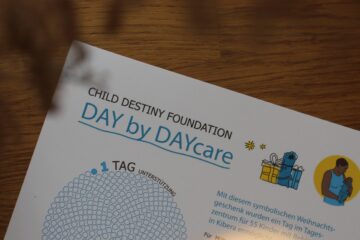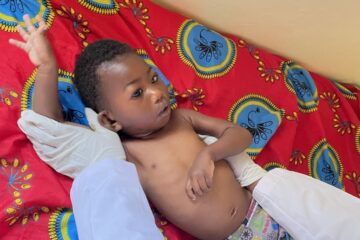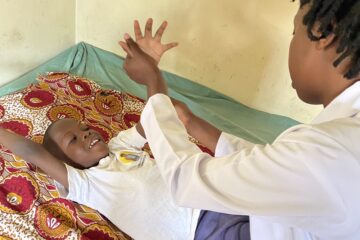Text by Zoé Paris
Nourish for Life
For a new program of access to nutrition for CDF
Context and current nutrition program
A few hours after starting to write this blog-article, I attended a conference in my university in Paris on the legislation of overseas French departments. Frederic Maillot, member of parliament for la Reunion, was one of the speakers. He made a striking statement which I immediately wrote down, as I found some connection with this blog-article’s topic. He said : “A people who does not plant what they eat is a people who is not free.” 1 In other words, people who are dependent on the international and long-circuit food market are not free. In places such as Kibera, this is coupled with high food prices and very low wages, the perfect recipe for food insecurity. Children with disabilities are at the forefront of this struggle.
This is where the nutrition program comes in. Initiated in July of 2024, this program has the current objective of feeding 114 children in total. The children receive daily meals at the daycare center and families who need it most also receive food and medication. But the program is ready to expand in various ways, and we will see why in this article. We’ll start with the current challenges faced by children today.
The realities of malnutrition for children with disabilities and girls in Kibera
One of the dilemmas of living in Kibera is that, in contrast to living in a rural area, not being able to rely on one’s production of food. Food expenditure in urban informal settlements like Kibera represents on average one third of a household’s total expenditure. Although Kenya’s food inflation rate decreased since the end of the pandemic, the country seemingly didn’t quite recover from it, standing today at 5% food inflation rate against Austria’s 2% rate, for example. As a result, only one fifth of the slum population of Nairobi is food secure and over 50% experience hunger. While the effects of food insecurity and malnutrition are detrimental to everyone, children and children with disabilities’ growth are particularly at risk.
First, malnutrition can cause disability in a way that child deficiency in micro and macronutrients is a risk factor of cognitive and/or physical impairment. Then, disabilities accentuate the risk of malnutrition in many ways. Oral difficulties are the main reason for malnutrition and largely affects children with cerebral palsy. Another main cause of malnutrition is the need (sometimes unattainable) for a special diet for children with disabilities such as cystic fibrosis. Socioeconomic factors of households of Kibera make it very difficult to provide special and nutritious diets for their children with disabilities. For example, supplements are crucial to preserve a child’s health but can often be out of reach. In addition, the social isolation and exclusion children with disabilities’ families endure can also lead to a limitation of information on and access to food. Therefore, children with disabilities living in Kibera and their families are doubly penalized. So can this cycle of malnutrition ever be broken and if so, how?
Nourish for Life: the value of a community-based approach for nutrition
Kenya is a net importer of food and 90% of its urban population depends on purchased food, making Mr. Maillot’s statement consistent with the reality of Kibera. But 10% do not depend on purchased food, and we need this number to rise. Through small-scale community-based initiatives, we can slowly but surely break the cycle of malnutrition and food insecurity.
Indeed, large-scale farming initiatives are made impossible due to the cost of land and its scarcity in Nairobi. With unattainable government zoning regulations leading to overpriced urban land, alternative, grassroot approaches to fight against food market dependence are essential. CDF’s nutrition program, which we wish to call Nourish for Life, wishes to encourage short-circuit food consumption by prioritizing the purchase of food from local sources. Ecological and economic benefits of re-establishing short circuit production and consumption are endless. Reducing food’s carbon footprint, funding the local economy, and financially supporting children and families in Kibera are just some of them.
Behind this project also lies a social motivation : to give the power of nourishment back to the community through education. Workshops will be organized by project managers and social workers with the help of nutritionists and agricultural extensions officers. The former will tackle nutrition, special diet, and proper feeding techniques for children with disabilities while the latter will delve more into urban farming techniques and resource mobilization. Along with these workshops, CDF also wants to implant community gardens in Kibera’s open spaces, for which we still need the local administration’s green light. Other approaches exist for households who have the space to welcome them, such as “sack farming” or gunny bags, a form of farming existing today already.
This ambitious program, aiming to reach over 350 individuals (children with disabilities, parents, and malnourished girls ) is not possible without your support. This year, you can gift your support to CDF by purchasing an originally-designed Christmas card, offered in two different color designs. Whether it serves as a gift for another person or for yourself, this card is a symbol of your solidarity with CDF. It is purchased through a custom donation system, meaning you can donate to the extent that you wish and are able to, and will receive your card with this donation. For example, you can secure one month’s worth of food for a child with disabilities and their family for just 10 euros. For even more, you can also support the workshops, urban gardening, and all other costs that this new nutrition program will represent. We know that with your help and with the success of the current nutrition program, that Nourish for Life will be successful. If that’s not food for the soul, I don’t know what is.
- Translated from French: “Un peuple qui ne plante pas ce qu’il mange est un peuple qui n’est pas ↩︎


